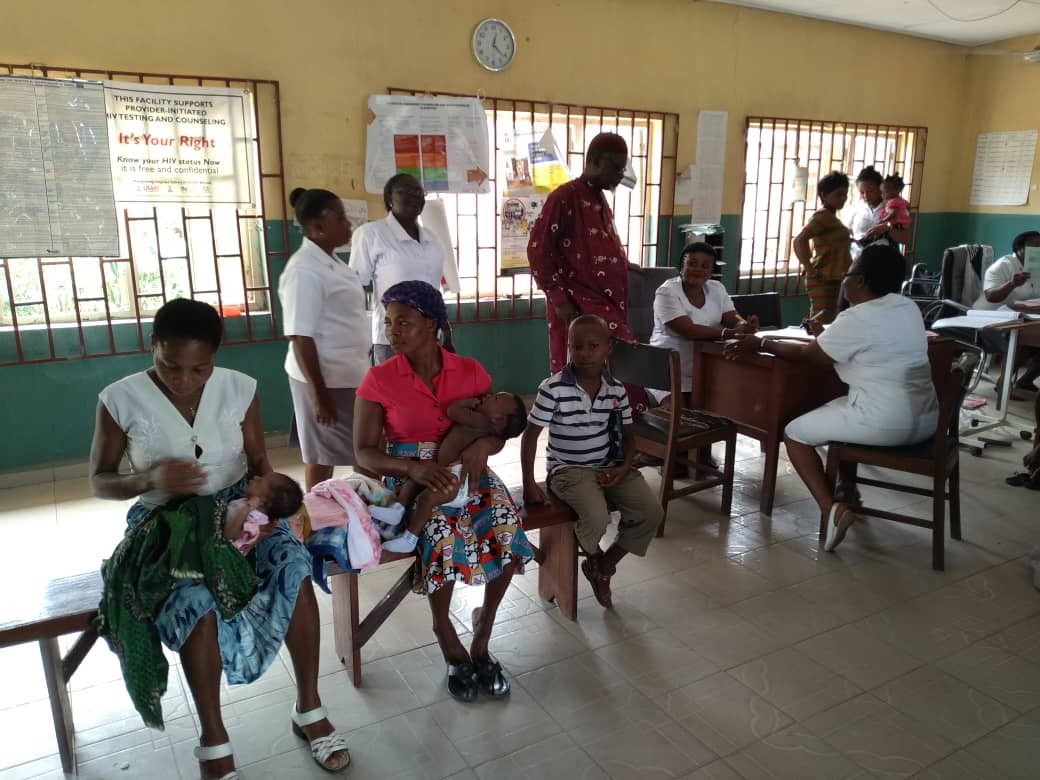
Over 70% of Nigeria's population is classified as poor, with 35% living in absolute poverty. Poverty is especially severe in rural areas, where social services and infrastructure are limited or non-existent. The majority of those who live in rural areas are poor and practice peasant agriculture for food and income. When people in the rural communities are sick, the first and nearest health facility to them is the Primary Health Centres (PHCs) but unfortunately, most people cannot access services at the health facilities because of fee for service (an out of pocket payment system).
In order to eliminate the out of pocket payment system that makes access to quality and affordable healthcare services inequitable among mostly the indigent vulnerable groups (for example, pregnant women and children under five years old), Ukana West 2 Community Based Health Insurance (CBHI) scheme was launched on the 21st August 2014 in the Primary Health Centre, Ikot Ideh, Essien Udim Local Government Area, Akwa Ibom State, Nigeria. CBHI is a not-for-profit organization and provides risk pooling (protection) to cover the cost of health care services. This not-for-profit healthcare financing mechanism is based on solidarity (an agreement, oneness) between members and democratically accountable to them. The program is managed by democratically elected members of the community and supervised by stakeholders. These include the community, Ministry of Health, National Health Insurance Agency (NHIS), Community Health Department, University of Uyo Teaching Hospital, and the Local Government Council.
CBHI is actively involved in resource mobilization, health sensitization programs in the communities, and also partners with NHIS/other relevant organizations to identify the indigent vulnerable groups and ensure that they have equitable access to quality and affordable healthcare services in the Primary Health Centre, Ikot Ideh throughout the year. The organization also provides secondary referral services for procedures such as cesarean sections, hernia, appendectomy, severe malaria, pregnancy scans, and complicated labor at the Cottage Hospital, Ukana. CBHI also partners with the Community Health Department of the University of Uyo Teaching Hospital for weekly medical consulting services at the health facility and also for research purposes. Every financially-able person in the community pays (₦5, 000) 12.95USD per head per annum to benefit from the program.
How effective is the Community Based Health Initiative (CBHI) intervention?
Before the inception of CBHI, the Primary Health Centre Ikot Ideh was dysfunctional with no drugs, high fee for services, lack of staff, poor service uptake, and documentation of service uptake. Mothers resorted to quack medical practitioners and traditional birth attendance for health services. Since the inception of CBHI in 2014, there is a lot of improvement from the evidence below which shows an increase in the service uptake by pregnant women and children under five years old in the health facility from qualified medical attendance.
Evidence of breakdown of service uptake by the indigent vulnerable groups in the Primary Health Centre, Ikot Ideh as a result of CBHI.
|
S/N |
SERVICE UPTAKE |
2014 |
2015 |
2016 |
2017 |
2018 |
2019 |
|
1 |
TOTAL NUMBER OF CHILDREN IMMUNIZED |
473 |
1431 |
873 |
1106 |
1545 |
830 |
|
2 |
TOTAL NUMBER OF CHILDREN UNDER 5 YEARS SERVICE UTILIZATION (0-5 YEARS) |
168 |
371 |
544 |
860 |
991 |
417 |
|
3 |
ANC |
455 |
442 |
458 |
620 |
475 |
395 |
|
4 |
TOTAL NUMBER OF DELIVERIES |
29 |
29 |
43 |
67 |
47 |
52 |
Source: Primary Health Centre, Ikot Ideh, 2020
The role of CBHI in attaining the Universal Health Coverage
Having CBHI in a Primary Health Centre and allowing the community to own and manage the program ensures that the health facility is functional and accountable. CBHI ensures that there is equitable access to quality healthcare services for all irrespective of the financial status, availability of drugs, community members seek healthcare from certified medical professionals and mothers receive antenatal and post-natal care and also deliver babies in the health facility. Other work of CBHI includes advocating for improved health financing, for the establishment of the State Health Insurance Agency, health sensitization programs, partnering with relevant organizations to coordinate training for community healthcare workers for effective health care delivery and provide incentives to the health workers.
In conclusion, a step towards achieving universal health coverage without leaving anyone behind is establishing a community-based health insurance/initiative where the community members own and are involved in the resource mobilization to ensure everyone has equal access to the healthcare needed. CBHI is not only effective but eliminates the need for out of pocket payments for healthcare services which deprive many healthcare services while taking into consideration the indigent vulnerable groups in the communities.
About the author
Akaninyene Obot: Lecturer/Researcher, Department of Agricultural Economic and Extension, Nnamdi Azikiwe University, Awka, Nigeria
Project Consultant, Ukana West 2 Community Based Health Initiative (CBHI), Primary Health Centre, Ikot Ideh, Akwa Ibom State, Nigeria
The views expressed in published blog posts, as well as any errors or omissions, are the sole responsibility of the author/s and do not represent the views of the Africa Evidence Network, its secretariat, advisory or reference groups, or its funders; nor does it imply endorsement by the afore-mentioned parties.